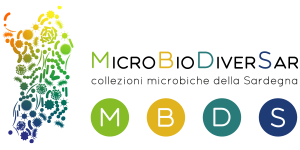The MicroBioDiverSar Project
In the last decades, the importance of plant, animal and microbial biodiversity has received increasing global attention and, in this regard, governments and international and regional organisations have adopted laws and regulations to promote its conservation and enhancement. Among these, Law 194/2015 “Provisions for the protection and enhancement of biodiversity of agricultural and food interest” has started the implementation of a national system, consisting of the National Registry, the Network, the Portal and the Standing Committee, which aims to preserve, in situ and ex situ, local species (animals, plants and microbes) of agri-food interest at risk of extinction or genetic erosion. However, the definition “risk of extinction” is not applicable to the concept of microbial species, so the implementing decrees of the law do not refer to microbial biodiversity, except to say that, given the complexity of the subject, will be included in further decrees. Therefore, at present, only animal and plant resources are included in Regional Repertoires and National Registers, while the consistency of the microbial resources patrimony conserved in ex situ collections by various Italian institutions is still unknown.
In this context, the project MicroBioDiverSar (Microbial Biodiversity of Sardinia), funded by the Ministry of Agriculture, Food and Forestry (Mipaaf) with the funds of Law 194/2015, has been the first concerning microbial resources. The aim of the project has been to survey and catalogue the microbial resources present in three Sardinian collections (Agris Sardegna, University of Sassari and University of Cagliari) through the design and realization of a database and a dedicated website, entrusted to the bioinformatics laboratory of the San Martino Hospital in Genoa.
These four institutes are also associate members or partners of the Joint Research Unit (JRU) MIRRI-IT which is developing the Italian network of microbial collections, with the common aim of overcoming the current fragmentation in the availability of resources and services and enhancing the quality management system of collections, focusing on the needs of stakeholders in the biotechnological transfer of the microbial resources.

The relational database, developed according to international standards, is the management tool of the collections partners of the project, while the website aims to be an important communication channel with the business world that operates in the agri-food sector and with other research institutions. In addition, the MicroBioDiverSar database is an opportunity to improve the partner collections of the project by comparing them with other Italian collections, characterized by more advanced systems of management and conservation of microorganisms.
At first, in order to reach the objective, the collection of all the available information about the number of accessions, species of the microorganisms, their origin, year and place of collection and storage methods was carried out. This phase required in-depth documentary research into the paper archives, since Information on isolates collected for several decades since the 1960s was not available in digital form, while data on the most recent isolates were reported in spreadsheets, which were often not homogeneous by structure. In addition, sometimes information on the same isolate was fragmented into different files. The next step was to create a single spreadsheet, containing information on all the isolates of each collection, following both international rules and the specific internal needs of each laboratory. At the same time, microbial resources have been physically rearranged and inventoried, codified and recorded.
The work carried out highlighted the presence of a great wealth of microbial resources in the Sardinian collections partner of the project. In fact, about 200 species of bacteria, yeast and fungi (over 150 already available online) have been included in the database, corresponding to over 20,000 isolates (over 2,000 already available online) from different matrices (milk and milk products from sheep, goat and cow; natural starter cultures; rennet paste; lamb digestive tract; table olives and brine, olive oil; grapes, grape must, wine; beer, wheat, barley, wheat, malt; traditional pork sausages, casing and meat; fish intestines, mussels) which will be accessible to the scientific community for study and research purposes and to the world of agri-food production.
In order for the work carried out thanks to the MicroBioDiverSar Project to continue to have a meaning and a concrete value over time, it must be possible to maintain and manage the microbial resources housed in the collections, through dedicated structural funding. Only in this way it will be possible to ensure the survival of microorganisms and their conservation in accordance with internationally recognised quality standards, which are necessary for the collections to attain biobank status and to play their key role, for the development of biotechnology and bioeconomy.


